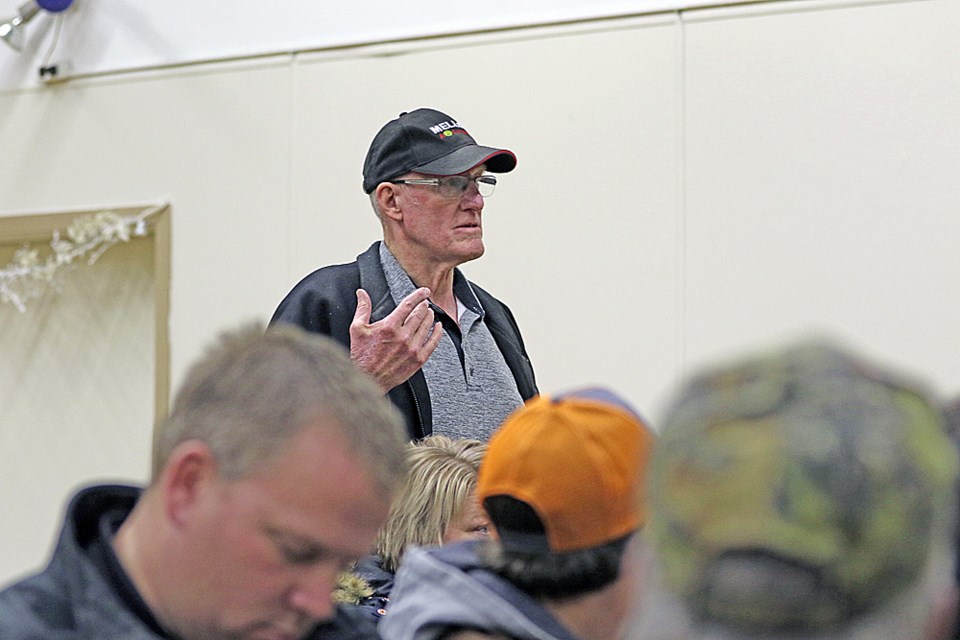Anger over civic taxes in Archerwill led to a public meeting – chaired by the president of the Saskatchewan Urban Municipalities Association as an outside authority to mediate over two sides.
The meeting filled the Archerwill Centennial Centre the evening of Oct. 26.
The tax debate began when Archerwill’s council decided to keep its tax rates the same: a base tax of $300 per property, plus around 1.68 per cent of the property’s assessment for residential properties, around 5.88 per cent of the assessment for commercial properties, and around 3.08 per cent of the assessment for agricultural properties.
The problem: property assessments were revalued last year, with most properties going up a little and some going up a lot. The result: an increase in taxes, not evenly distributed across the village.
Myrna Christianson, a member of the Concerned Archerwill Taxpayers, an advocacy group formed after the tax levy was issued, said the taxes were unfair.
“What most towns, villages and cities did, instead of passing a whole bunch onto their taxpayers, is they adjusted the mill rate [which dictates taxes based on proportion of an assessment]. Some people changed the base tax, or did whatever they had to do to make it more fair,” she said. “Our beef is that they didn’t consider any of that here.”
Jody Hagenes, Archerwill’s mayor, said council realized that taxes would increase, but they didn’t realize how it would affect certain properties.
“We figured with leaving the mill rate the same, taxes would go up, but it wouldn’t be unbearable. As it turned out, we were wrong – on some of them,” he said. “We didn’t specifically go house by house and see how the assessments went up.”
There are some expenses coming up for the village: it received a grant to upgrade its water treatment plant, the sewage lift station needs repairs, some equipment needs to be replaced and the village has to pay 28 per cent of the cost of closing down the Ponass Lake Landfill.
After the tax was levied, the Concerned Archerwill Taxpayers spoke at council twice. Neither side was satisfied with how those meetings went, with council feeling mobbed and the taxpayers feeling they were ignored. The frustration soon manifested itself into life in the village at large.
The Concerned Archerwill Taxpayers contacted the province’s municipal ministry, which suggested they spark a public meeting through a petition. They got twice the amount of signatures required.
At the Oct. 26 meeting, both sides had an opening statement, followed by a long question period where villagers could ask council – and the Saskatchewan Assessment Management Agency, which sets the values of property assessments – questions. Gordon Barnhart, the president of the Saskatchewan Urban Municipalities Association, chaired the meeting and was tasked with keeping proceedings civil.
“There’s some division, certainly, in the community, but by the time it ended, I’m sensing there was a coming together of people in this community and that is so important,” said Barnhart, a Saltcoats councillor. “All of the small communities of Saskatchewan, there’s a lot of pressure on us with sewer and water and all of those issues, and we have a small tax base.”
As for trying to prevent a similar situation from happening next year, council is planning to hold a public meeting before the taxes are levied.
“We’re going to start looking at taxes earlier than we did this past year,” Hagenes said. “If we don’t start earlier, then we’ll end up in the same boat next year, rushing through it and getting the taxes out. In December, we’re going to start looking at it.”
Council wants to examine the base taxes and mill rates it issues to try to come up with a reasonable solution.
“Chances are, the taxes will come down next year,” the mayor said.
On their Facebook page, the Concerned Archerwill Taxpayers said it was good to see the number of people that attended the meeting.
“So, a few things were accomplished. The meeting was held. The mayor and councillors all showed up, sat there and faced people. They admitted some decisions maybe weren’t the best,” they wrote. “As for the ongoing narrative that this has split the town. Nonsense. Taxpayers want fair taxes. How can there be another side?”




